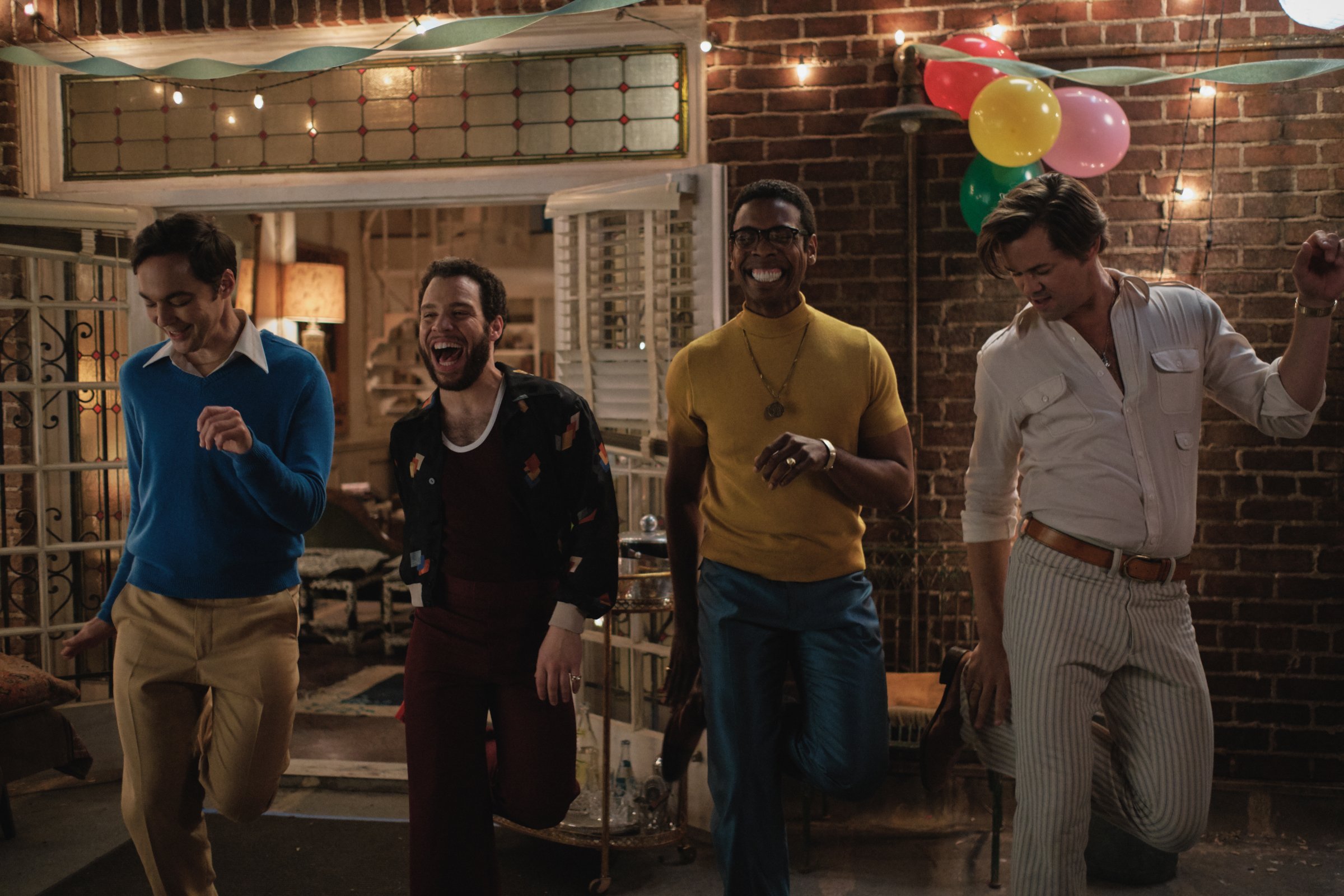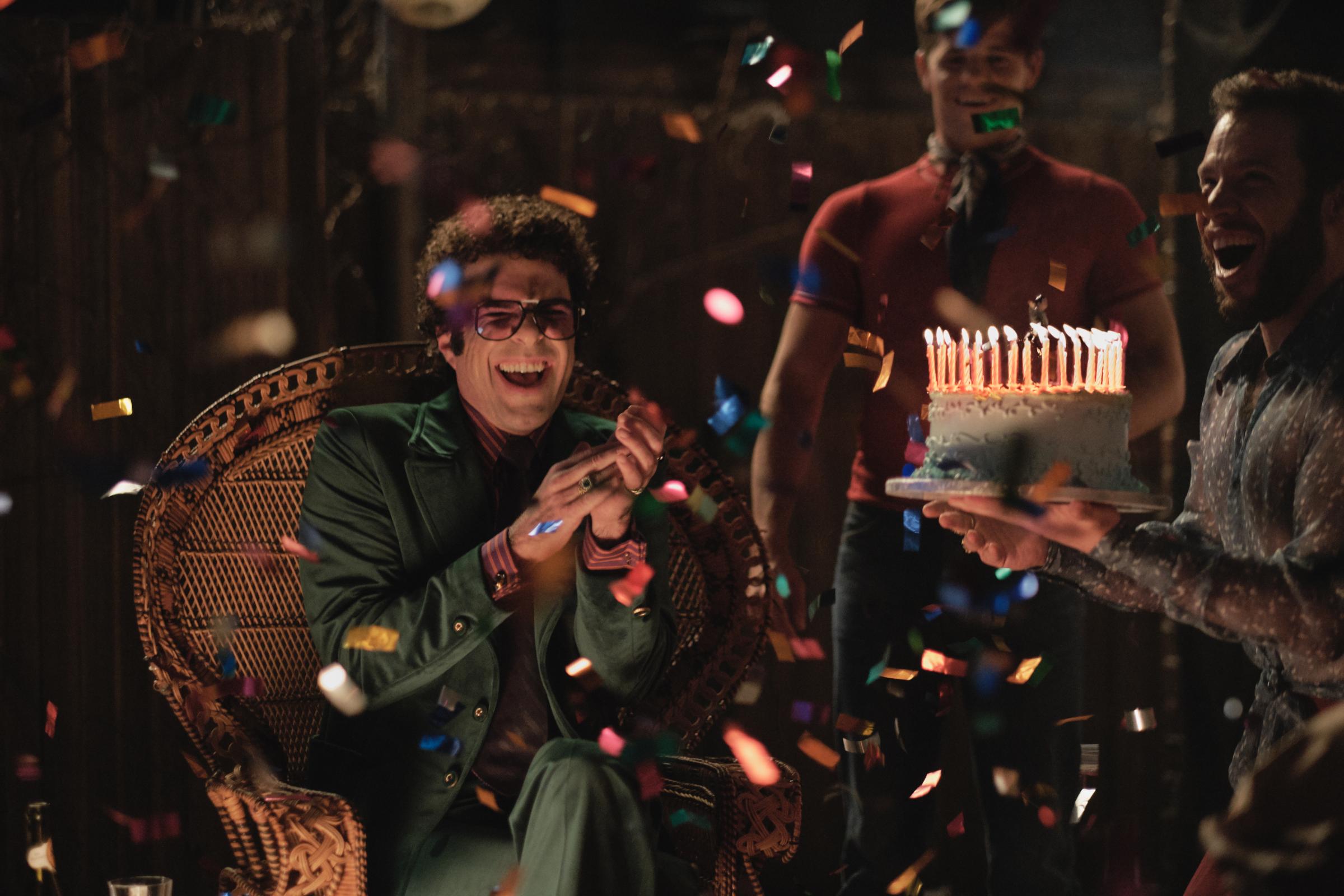
The word dated is thrown around too casually these days, often used pejoratively whenever someone finds an older movie, book or play strange or just not in tune with how we think today—as if the work of the past were somehow responsible for reading into the future and fine-tuning itself accordingly. Yet works that are very specifically of their time can be more useful to us than safe, generically timeless ones. They show us where we’ve been and how far we’ve come—sometimes even as they reveal failings we still have to work on.
That’s the value of Joe Mantello’s adaptation of Mart Crowley’s revelatory 1968 play, The Boys in the Band, now streaming on Netflix. Things are different now: when it appeared, Crowley’s off-Broadway play astonished audiences with its frank treatment of the shame, guilt and fear—as well as the sense of joy and community—of gay life in New York City at the time. But in a country where legal gay marriage is a fairly recent development—and in a world where prejudice of all sorts, over race or sexual orientation or gender identity or any combination thereof, still thrives—The Boys in the Band is anything but a relic. This version, produced by Ryan Murphy and performed by the same cast that appeared in the play’s 2018 revival on Broadway, is like an unusually strong telescope, giving us a clear and vivid view into a not-so-distant past.
Jim Parsons plays Michael, a screenwriter with expensive tastes who has fallen into debt; he also drinks too much, and has taken steps to rectify that. He’s about to host a birthday party for a close friend, smooth Jewish hipster Harold (Zachary Quinto), when he gets a call from his old college roommate, Alan (Brian Hutchison), who’s in town from Washington. Alan is nearly in tears, and desperate to see his old friend. Michael staves him off; Alan still doesn’t know—or pretends not to know—that Michael is gay. Michael hasn’t clued him in, but he knows there’ll be no keeping that secret once Alan meets Harold and his other party guests: There’s Donald (Matt Bomer), an old flame of Michael’s who has left New York in an effort to overcome his seemingly insurmountable neuroses; Emory (Robin de Jesus), a bubbly professional decorator; well-mannered librarian Bernard (Michael Benjamin Washington); and Larry (Andrew Rannells), a commercial artist, and Hank (Tuc Watkins), a math teacher who has just left his wife and kids—the two are now a couple, but the tension brewing between them is close to boiling over. There’s also an adorable but not-too-smart singing cowboy (Charlie Carver), whom Emory has hired for the amusement of the birthday boy.

Alan does show up at the party, and Michael becomes so stressed out that he pours himself a drink—and then another, and another. Michael’s apartment is modest (at least by Manhattan movie apartment standards), but he does have a little terrace, where he’s set up lights, chairs and a table for the party. There, the men flirt and bicker and tease one another with sexual innuendoes; they also dance to records and eat cake. This group is extremely close, even when it seems they can barely stand one another: Hank becomes jealous—or more jealous than usual—when he realizes that Larry is perhaps a little too well acquainted with one of the other guests. (“We’ve never met, but we’ve seen each other,” Larry explains cryptically.) Emory and Bernard, both of whom are Black, needle one another in ways that go beyond good-natured jibing; there’s some class resentment there, another layer of tension in the group dynamic. And Michael, whom the others mock for his reliance on religion, which they see as hypocritical, can barely hide his self-loathing, particularly after a few drinks. The story hinges on a cruel party game that he devises, which demands that his guests—including straitlaced, homophobic Alan—publicly confront certain painful aspects of their lives.
The first thing you’re likely to notice about The Boys in the Band is its mildly stiff artificiality, a common trait of material that has made the transition from stage to screen: this is not quite a film and not quite a filmed play, but perhaps something in between. And to modern audiences, these characters may seem like convenient gay “types”—the flamboyant decorator, the bitter, lonely writer, the randy swinger who’s not sure monogamy is for him.
But for gay men in 1968, it was rare to see even a type—that is, a gay man whose sexuality was just part of living, as opposed to a narrative tool used to make some cautionary point, or as a mark of weakness or evil. Crowley rounds out each character with layers of detail, and this ensemble of actors rises to the challenge of making us see these men as more than just a bunch of guys who lived a long time ago, in the days before the radical changes wrought by Stonewall and, later, the AIDS crisis. Their lives were complicated, and lived partially in shadow, but the intensity with which they lived was no less for that. We see that Hank’s hetero marriage, even if it was a lie, was painful for him to leave behind; that Michael is cruel to others—albeit sometimes amusingly so—because even though he makes a great show of keeping everything together, he’s shredded by self-doubt; that Bernard is rankled by Emory’s sometimes nasty racial teasing, but that the two share a bond the others can’t understand. The Boys in the Band is a product of its time, but that doesn’t mean it can’t speak to ours too. In the context of human civilization, 50-something years is barely a blip. And our yearning to be our best selves, even when it seems that every card is stacked against us, doesn’t go away, no matter how enlightened we think we’ve become.
More Must-Reads From TIME
- The 100 Most Influential People of 2024
- The Revolution of Yulia Navalnaya
- 6 Compliments That Land Every Time
- What's the Deal With the Bitcoin Halving?
- If You're Dating Right Now , You're Brave: Column
- The AI That Could Heal a Divided Internet
- Fallout Is a Brilliant Model for the Future of Video Game Adaptations
- Want Weekly Recs on What to Watch, Read, and More? Sign Up for Worth Your Time
Contact us at letters@time.com